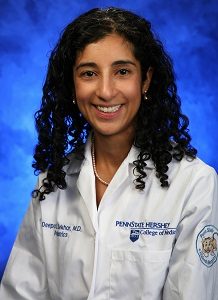Several College of Medicine researchers earn grants

A number of Penn State College of Medicine researchers recently received grants.
- Colin Barnstable, DPhil, professor and chair of the Department of Neural and Behavioral Sciences, will study the molecular mechanisms that control the levels and activities of mitochondrial uncoupling proteins to design drugs that will have the therapeutic potential to treat a range of neurodegenerative conditions. He received $229,950 from the National Institute of Neurological Disorders and Stroke. This is year one of a two-year study.
- Dr. Stephanie Gill, assistant professor in Family and Community Medicine, received a $199,364 grant from the Health Resources and Services Administration for her proposal, “Responding to the needs of the community: Developing an oral health curriculum at Penn State College of Medicine.” The purpose is to support the development of junior faculty members in Family and Community Medicine in integrating oral health and primary care across the undergraduate and graduate medical education curricula. Gill's proposal also aims to enhance oral health assessment, screening, prevention and education in Penn State Health teaching and community practices. This is year two of a five-year grant.
- Junxuan Lu, PhD, a pharmacology professor, received a $214,380 grant from the National Cancer Institute to investigate the repurposing of two drugs as combination therapy against certain major subsets of aggressive prostate cancer. “Translational development studies of a novel combination therapy for castration-resistant prostate cancer” is in year one of a two-year study.
- Christopher Norbury, PhD, professor of microbiology and immunology, and John Wills, PhD, professor of microbiology and immunology, will study the role host proteins play in the spread of herpes simplex virus (HSV-1). Norbury and Wills received $191,625 from the National Institute of Allergy and Infectious Diseases for their study, “The role of PTP1B in cell-to-cell spread of herpes simplex virus in vivo.” This is year one of a two-year study that was developed from a recent publication from the Wills lab.
- Dr. Deepa Sekhar, associate professor of pediatrics, received a $300,000 grant from the Health Resources and Services Administration to evaluate adolescent depression screening in the school setting. The primary goal of the three-year study, “Randomized control trial of universal vs. targeted school screening for adolescent major depressive disorders,” is to increase identification, referral and treatment for adolescent major depressive disorder by determining the effectiveness of universal versus targeted screening in a school setting.
- Hong-Gang Wang, PhD, Lois High Berstler Professor in pediatrics and pharmacology, received a $312,445 grant from the National Institute of General Medical Sciences for his study, “Autophagosome closure by the ESCRT machinery.” The goal of this project is to determine how autophagosome, a double-membrane vesicle, is sealed during the intracellular waste disposal and recycling process called autophagy. This is year one of a four-year study.

Dr. Deepa Sekhar
If you're having trouble accessing this content, or would like it in another format, please email the Penn State College of Medicine web department.
